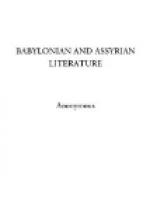May the god Anu, Bel, Hea, the great gods, afflict him and curse him with maledictions which are not (retracted).
May the god Sin, the splendid in the high heaven, envelop all his members with incurable leprosy until the day of his death; and expel him to the farthest limits like a wild beast.
May Samas, the Judge of heaven and earth, fly before him; that he change into darkness the light of the day.
May Istar, the Sovereign, the Queen of the gods, load him with infirmities and anguish of illness like arrows, may she increase (day and night his pains,) so that he runs about like a dog, in the ways of his town.
May Marduk, the King of heaven and earth, the Lord of the eternity without end, entangle his weapons with bonds which cannot be broken.
May Ninip, the god of crops and boundaries, sweep away its limits and tread upon his crops, and remove its limit.
May Gula, the mother (nurse), the great Lady, infect his bowels with a poison, and that he void pus and blood like water.
May Bin, the supreme Guardian of heaven and earth, inundate his field like a ...[12]
May Serah suffocate his first-born.
May Nabu, the holy minister of the gods, continually pour over his destinies laments and curses; and blast his wishes.
May all the great gods whose name is invoked on this table, devote him to vengeance and scorn, and may his name, his race, his fruits, his offspring, before the face of men perish wretchedly.
By this table, the author of the everlasting limits has forever perpetuated his name.
[Footnote 1: See at the end.]
[Footnote 2: These 25 hins represent 75 litres, 16 gallons and a half, for seeding a surface of 207 acres.]
[Footnote 3: The great U, or arura.]
[Footnote 4: Again in this deed no statement is given in account of the measurings. The space is determined merely by the indication of the boundaries.
This document is also the charter of a royal donation: it is not clear whether the below-mentioned objects are the price, or if, what is much more verisimilar, they are only the accessoria of the field.]
[Footnote 5: Measurer is expressed by “masi-han.”]
[Footnote 6: Cf. I Kings x. 29: “A chariot ... of Egypt for 600 shekels of silver; and a horse for 150.”]
[Footnote 7: It is a question here of the utensils used for measuring, viz., thirty of one kind, and sixty of another.]
[Footnote 8: The quality of the dogs is somewhat uncertain.]
[Footnote 9: There is evidently a fault in the total number, 616 instead of 716.
A weight of silver may be an obolus, the 360th part of a mina.]
[Footnote 10: The “akli,” who were at the royal court, may have been legists.]
[Footnote 11: All these are formulae solennes, as in the Roman law.]
[Footnote 12: Obscure.]




